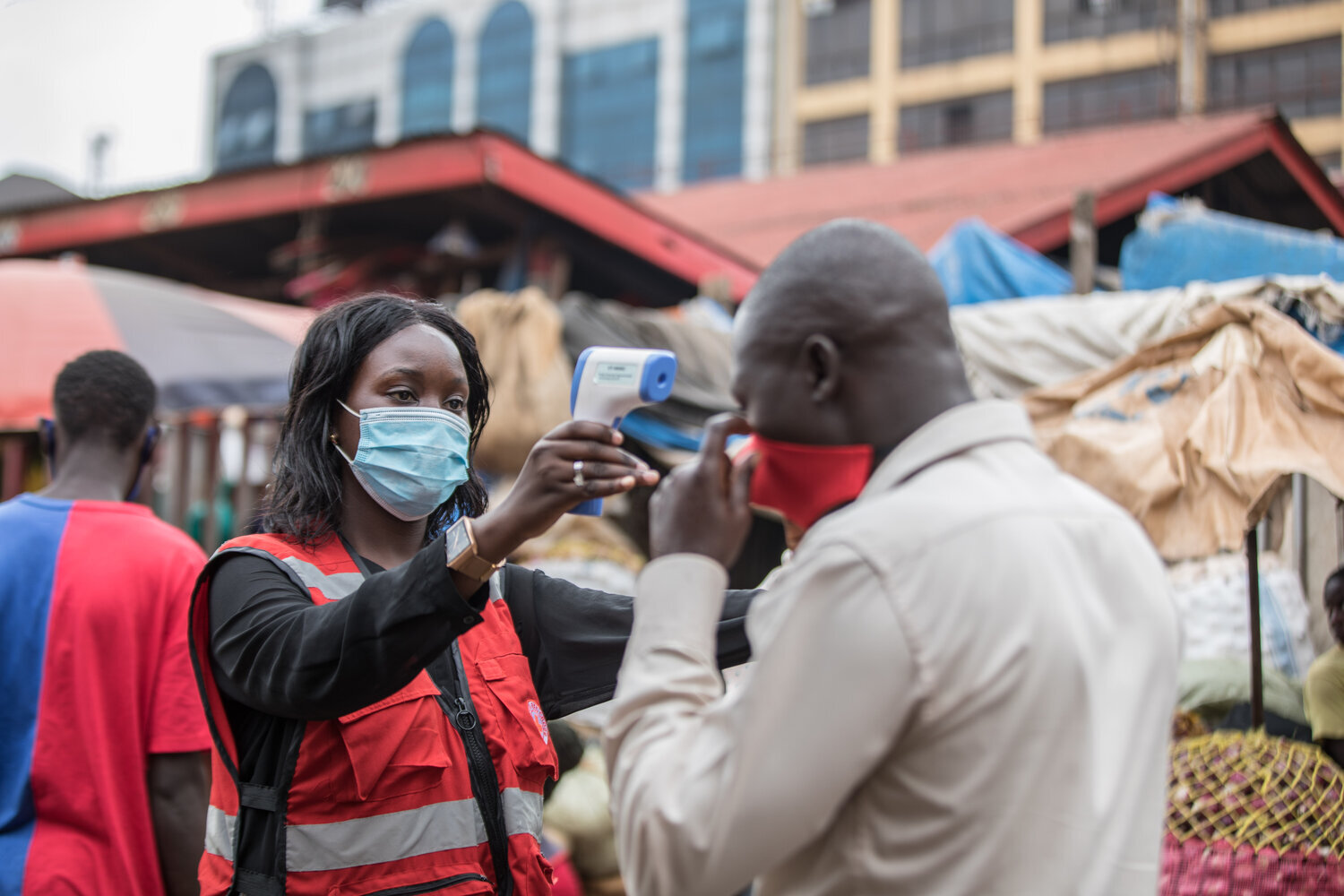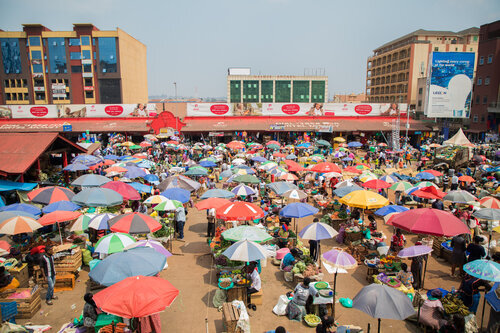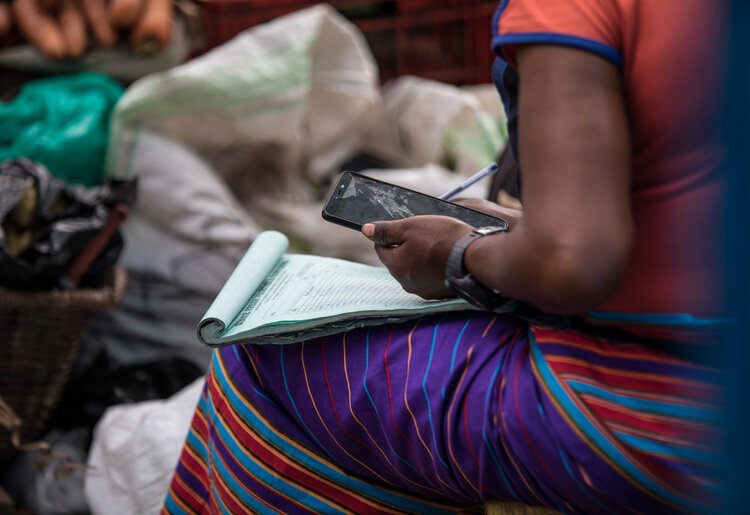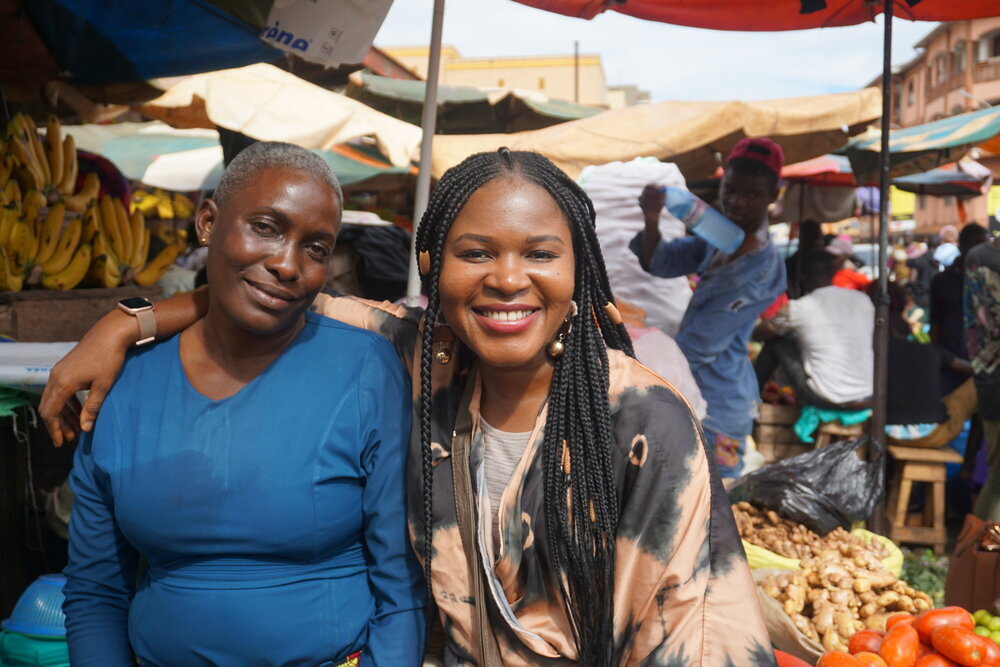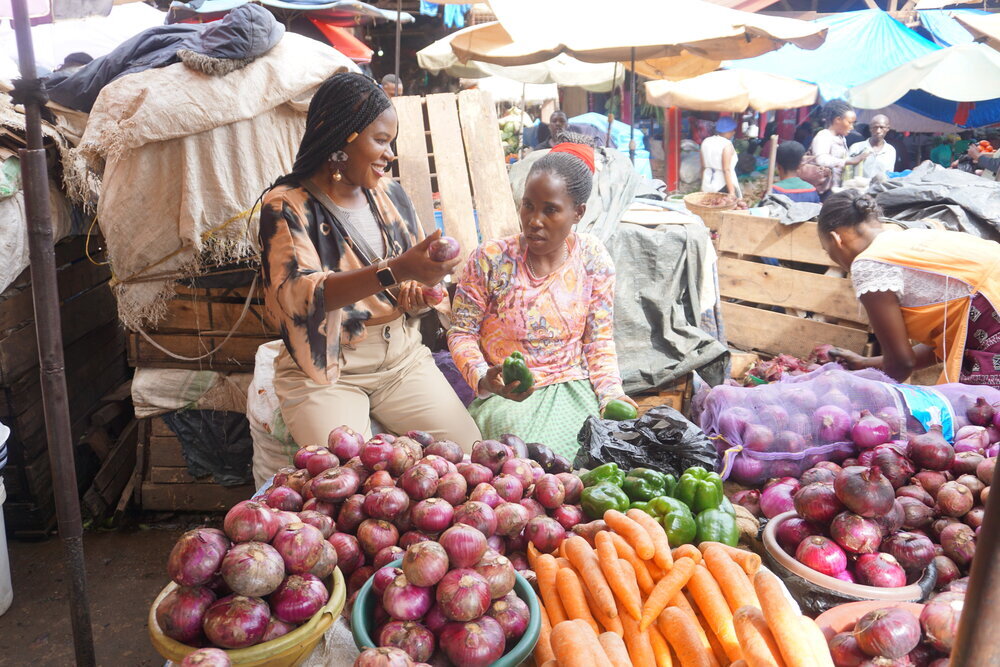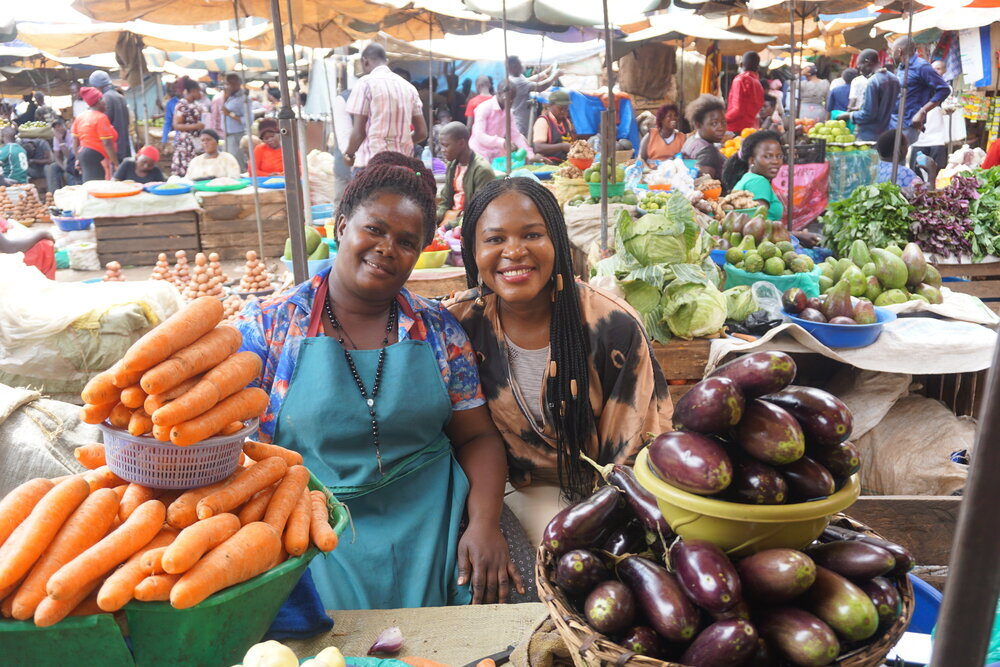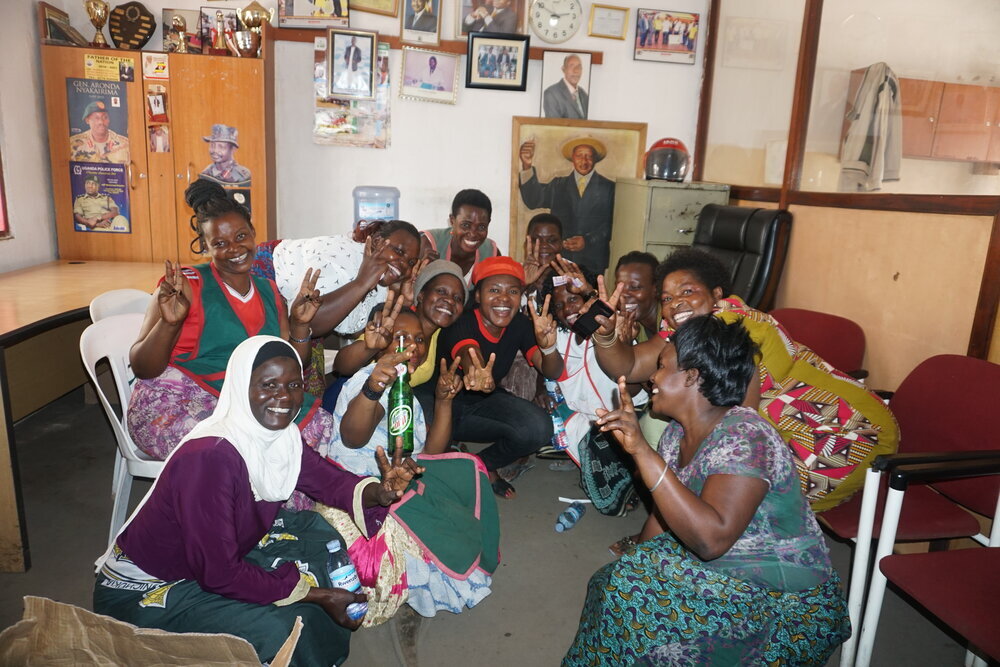Uganda’s COVID-19 Financial Relief Strategies Should Include Market Women
Babirye Yudaya sits at her vegetable market stand at the Nakasero Market in Kampala Uganda. After a two month mandatory lockdown, the Ugandan government now permits vendors who sell food items to operate. Photo courtesy of Zahara Abdul.
Kampala, Uganda - On a rainy Monday morning in July, Nakato packed her weekly duffle bag filled with clothes, food, and essential items. It would be a long week's stay at the Nakasero Market where she operated a stand selling the fruits of her labor. She double-checked her PPEs to ensure she didn’t leave anything behind. Masks? Check. Hand sanitizer? Check. Gloves? Check. Since early March, the COVID-19 pandemic and subsequent governmental lockdown measures have restricted the movement of women essential workers who heavily depend on their daily work to support their families. However, like many countries without a contingency plan to respond to the economic fallout of a global viral outbreak, everyone transitioned into a state of uncertainty. Market women entrepreneurs like Nakato were forced to abruptly close shop. For two months, Nakato, and other market women, were mandated to stay at home. Overnight, fear and desperation settled like a thick fog onto the empty market stands as everyone pondered the emotionally charged question: how will I support my family? Currently, only market vendors who trade food items (Nakato sells vegetables) are permitted to operate. Inversely, market vendors who sell non-food items are prohibited from selling their goods, eliminating their sole source of income. While enforcing strict social distancing measures are necessary to prevent the spread of the coronavirus, as the government begins the arduous task of distributing financial relief funds, it is imperative to include market women in these plans and that they too are given money to alleviate the economic losses caused by the pandemic.
A woman from the Kampala Capital City Authority (KCCA)checks the temperature of a shopper. The KCCA monitors and inspects the activities of the markets to ensure safety measure are adhered to.Photo courtesy of Zahara Abdul.
Babirye Yudaya selling her vegetables. Everyone is required to wear masks and not complying results in a fine. Photo courtesy of Zahara Abdul.
Nakasero Market in Kampala, Uganda. Photo courtesy of Zahara Abdul.
A man checking the temperature of a market woman. Photo courtesy of Zahara Abdul.
Nakato walked steadily to the Makindye taxi station, her mask securely on, duffle bag tightly tucked under her left armpit, and a navy blue umbrella in her right hand. Her personal radio announced the daily surge in coronavirus cases around the Kenyan/Ugandan border. At the Makindye taxi station, she joined a long queue of disgruntled commuters, who because of social distancing rules, waited an hour longer than usual to catch rides to work. This was Nakato’s new reality.
In Uganda, almost all informal business ventures (market women, street vendors, and garment workers) require daily operational activities to earn an income. Simply put, no work means no pay. SIHA Network, a women advocacy non-profit based in Uganda reports that 80% of Uganda’s labor force is employed in the informal sector. Market vending employs more than 70% of Uganda’s urban population, and women vendors form the majority within these markets. Where gender equity is concerned, discrimination and exclusion of women are generally rooted in the African culture and rears its head in financial discussions. The mandatory two months hiatus at the start of the pandemic translated to dwindling to no money for living expenses. Without significant savings to buffer financial losses incurred by the coronavirus lockdown, many market women lost their livelihood. They are still suffering from the fallout of the pandemic and need comprehensive governmental support on the road to recovery.
Florence Atedu shows a market woman proper hand washing techniques. Hand washing is also a requirement. Photo courtesy of Zahara Abdul.
Market woman at work. Photo courtesy of Zahara Abdul.
Photo courtesy of Zahara Abdul.
Earlier this year, Nakato had plans to expand her vegetable business at Nakasero market, one of Kampala’s biggest markets located at the heart of the city. She started her business with the help of the market’s savings and credit cooperatives (SACCOs). SACCOs are community-organized economic institutions managed by members who have the common goal of saving, borrowing loans, and building credit. They rely on member contributions in the form of savings and shares as the main source of capital. Members can then borrow from the starting capital at low-interest rates. Most women in the informal economy do not have bank accounts and rely on SACCOs, which has become a better banking choice for women entrepreneurs. Nakato was an avid saver at the market’s SACCO, which empowered women like her to start and or expand their businesses. SACCOs are estimated to bring in over 3 billion Ugandan shillings a year ($815,394 USD). A year ago, Nakato lost her husband to alcoholism and is now the sole provider for her five children. In fact, most of the market women are single mothers or widows. They are the breadwinners of their families. Having a market stand at Nakasero not only provides a means of income but also guarantees her and her children access to basic necessities and a life of opportunities. When the pandemic first hit in March, the SACCO at Nakasero had to close down as women withdrew all of their life savings in a panic. Florence Atedu, the treasurer and operations manager at the market’s SACCOs shared her frustration of the COVID-19 pandemic when the lockdown was first announced. “I’m so worried about the SACCO. They [the market women who invested money into the fund] have taken all their money. They will come back very poor and we will have to start from scratch after doing this for years!” Months after lockdown, women who were given loans from the SACCO now owe and are unable to pay back because business is slow or nonexistent. Florence says many of the women used up their capital during the pandemic for basic needs such as food, rent, and transportation. To complicate matters, schools have shut down and their children now require 24/7 child care. Market women and are now struggling to make financial sense of their businesses and supporting their households.
“I have lost all my life savings and I do not know where to start,” Nakato said almost inaudibly. Seated beside her, I watched as she arranged cartons of green pepper, carrots, and aubergine on a table. Nakato was one of 300 business owners I interviewed at the beginning of my Fulbright fellowship, where I investigated the financial impact of SACCOs on women entrepreneurs in the region. Returning to the market after lockdown, I witnessed how she and other business owners are struggling to reconstruct their worlds that had just fallen into shambles. In fact, her current struggle captures the plight of hundreds of informal traders across Kampala and around the world. In a recent interview with Rita Atukwasa, the executive director at the Institute for Social Transformation in Kampala, she echoed the frustration of market women across the city. “How do you live for four months without working? It is a very unfortunate situation and it seems like there is much worse to come.” Her organization has worked with over 800 market women, through training and advocacy programs to support and amplify women’s voices in markets across Kampala.
The path to economic recovery is precarious as governments, financial institutions and global entities begin to map out the course to curb the long-term spread and impact of the coronavirus. With the market women in the informal sector being part of the more vulnerable members of society, it is important government take into account the financial relief of market women and small business owners in the informal economy. “Bring economic stimulus packages directly to the women and not through banks. They know where these women are and they know how to find them,” Says Atukwasa. In the past, the government has made low interest micro finance loans available to SACCOs through an exhaustive application process. The board members of the Nakasero SACCO applied but never heard back on the status of the application and never received the financial support they sought. I bring this up to say there must be intentional and strict follow through and follow up protocol to guarantee the market women receive COVID financial relief funds. The world bank recently announced a $33 million economic crisis and recovery development financing budget to “support operation for Uganda to boost the government’s capacity to prevent, detect and treat the coronavirus, protect the poor and vulnerable population, and support economic recovery”. I implore the Ugandan government to consider long term investments in SACCOs, which is one tangible way of facilitating the circulation of cash in markets where SACCOs have a presence. Investing in SACCOs will not only support women vendors and guarantee the flow of capital, but it will also sustain the culture of savings and investments while strengthening support networks where women look out for each other. SACCOs have training programs that teach women about growing and scaling their businesses, bookkeeping, and many other important skills that enable them to thrive. The government should invest in community efforts to help develop skills that could be useful during these trying times because the informal sector provides a livelihood for the most vulnerable of the urban poor.
Market woman Hadija Nabossa. Photo courtesy of Zahara Abdul.
I traveled to Kampala, Uganda under my Fulbright fellowship working to understand the impact of SACCOs on women entrepreneurs. Although many Fulbright Fellows left at the onset of the pandemic, I made the difficult decision to stay. These photos are from before the pandemic and subsequent governmental lockdown and are of the market women I collaborated with.

